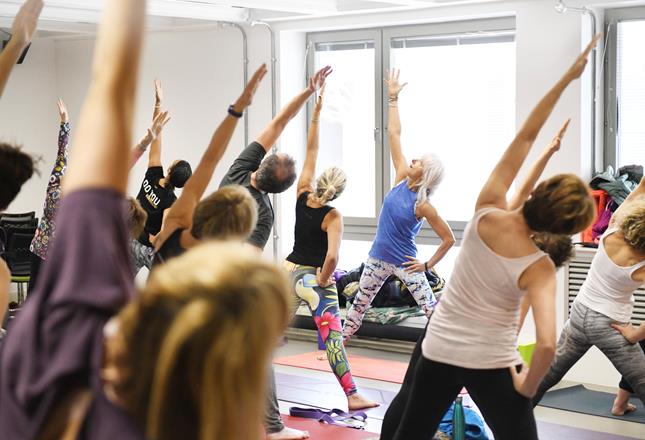
With its ability to calm the mind as well as strengthen the body, yoga is deemed the perfect exercise to help you cope with the demands of everyday life.
Dawn Wesselby, Chair of the British Wheel of Yoga, shares her tips for how you can start incorporating more mindfulness into your busy schedule.
How would you describe Yoga?
According to the Yoga Sutras of Patanjali 'Yoga is the calming of the fluctuations of the mind' which might surprise some as it is often seen as a form of exercise.
Classes include an element of breath control and relaxation and/or meditation. Some classes will also include chanting and work with energy locks (mudras). Yoga develops self-awareness and works to harness the mind, eventually bringing the practitioner into a state of awareness and calm.
How can someone get involved?
Classes are taught in yoga studios, village or church halls, gyms, and anywhere else offering a space to gather. We recommend you visit our website to find a suitable teacher offering a class you are interested in.
With COVID-19 many classes have moved online. Many teachers are live-streaming via Zoom so it’s an ideal time to try out something new, either in a group setting or on a one-to-one basis.
Why should people give it a go?
There are so many different styles of yoga that there is bound to be one that suits you. When I first went to yoga I was very competitive and stressed. I would have loved a very dynamic practice but the only one available was a very slow, reflective class which was what I really needed - sometimes what we resist is what we really need.
What advice would you have for anyone looking to take up yoga?
Try a few different styles to see what you enjoy, but as mentioned above, please bear in mind that we are often attracted to the style that supports how we currently are rather than what we actually need.
If you are a stressed executive you may well be drawn to more dynamic forms but what you really need is a slow and gentle class - being still is an incredible challenge for people with busy minds.
What are the physical and mental health benefits of your sport?
Depending on the style of yoga and amount of practice you do, you can expect to reduce tension in the body, and potentially become more flexible and calmer.
For me, I have found the philosophical side coupled with pranayama (breath control) and mantra very helpful when dealing with difficult life events. As people feel more isolated due to COVID-19, a weekly yoga class can really help keep the body moving and reduce anxiety and stress.
How do you see your sport developing in the years ahead?
As yoga has grown exponentially over the last few years, I hope that the real essence of the practice can come to the fore. Yoga is all-encompassing and can benefit so many people regardless of their physical ability and I really hope that this can be portrayed more within the media.
The Sport and Recreation Alliance is delighted to confirm former Rugby Football League (RFL) CEO, Ralph Rimmer OBE, as the Chair and Jack Baker as Deputy Chair of the new NGB Coalition.
Read moreIt is with immense sadness that the Sport and Recreation Alliance learned of Andy Sutch’s passing last week, and we send our deepest condolences to Andy’s family and friends.
Read moreThis afternoon, the Chancellor delivered her Budget speech to Parliament, outlining decisions on tax and spending.
Read moreJoining the Sport and Recreation Alliance is pretty simple, but worthwhile!
Register now